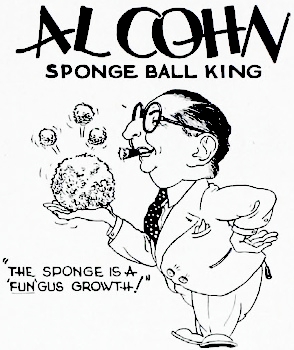Help us get to over 8,755 articles in 2024.
If you know of a magician not listed in MagicPedia, start a New Biography for them. Contact us at magicpediahelp@gmail.com
Sponge balls
Sponge balls, made of sponge rubber or polyurethane foam and usually about 2 inches in diameter, are a common prop used in many sleight of hand routines.[1]
History

The first known trick with sponge balls was sold by Jesse J. Lybarger in 1925, and publishing the following year in The Linking Ring.[2][3] Also in 1926, Joe Berg introduced his Cups and Balls Routine wherein he made use of balls made of sponge instead of the usual cork.[4]
In the early forties, Al Cohn, owner and operator of The Magic Center in New York City, became known as the "Sponge Ball King." He claimed to have invented Sponge Balls and sold his Famous "Streamlined" Sponge Ball Routine starting in 1944,[5] He was often cited as the inventor, but Milbourne Christopher wrote in 1952 in his column in The Linking Ring that Lybarger deserved credit for the trick. But, Christopher "...[did] not believe that [Cohn] was aware of Mr. Lybarger's work."[6]
Al Stevenson devised a process for making perfect spheres from the polyurethane foam and later Albert Goshman improved the process.
Noted specialists in sponge ball magic are Audley Walsh, Frank Garcia, and Frances Ireland Marshall.
Roy Benson also used sponge balls for his Benson Bowl routine, as adapted and popularized by Don Alan.
Variations
Sponge Rabbits
Robert A. Nelson, known for his work as a mentalist, invented the Sponge Rabbits. He started selling his trick Peter Rabbit Goes to Town! in the mid-forties, and it was published in J. G. Thompson, Jr.'s My Best in 1945.
In 1982, Daryl's Peter Rabbit Hits the Big Time created a resurgence of interest in the Sponge Bunnies.
Irv Weiner introduced "3D" Rabbits in the fifties,[7] and Nielsen Magic offered George Murray's Professional 3-D Multiplying Rabbits in 1989. In 2001, Magic by Gosh, now run by Al's son, Steve Goshman, started manufacturing and selling Magic by Gosh's 3D Rabbits, with instructions by Michael Ammar.[8]
"Clones"
In the early eighties, Patrick Martin introduced Clones, which were sponge balls with clown faces.[9] The trick also came with an eyedropper, with which the performer could "suck" a "Clone" out of one hand, and then "squirt" it into the other.
Ron Bauer wrote a topical version called The Clones From Brazil, with custom sponge balls that resembled a particularly notorious character from the first half of the twentieth century. (Hint: they had angry, blue plastic eyes and a tiny wedge of black sponge mustache. Remember The Boys From Brazil?) Bauer's version also featured a new technique for the common "sponge pass."
Publications
- The Phantom Balls (Jesse J. Lybarger): Marketed item, 1925. Carl S. Lohrey.[10]
- The Linking Ring, Vol. 5 No. 2 (October 1926, p. 33).
- The Linking Ring, Vol. 23 No. 3 (May 1943, pp. 82-83).
- Sponge Ball Manipulation: Audley V. Walsh, 1936.
- Peter Rabbit Goes to Town! (Robert A. Nelson): Marketed item, 1945.
- J. G. Thompson, Jr., My Best (1945, pp. 182-183).
- Peter Rabbit Hits the Big Time (Daryl): Stephen Minch, For Your Entertainment Pleasure (1982, pp. 11-17).
- Sponge Ball Routine (Al Cohn): Marketed item, 1944.
- Frank Garcia, The Encyclopedia of Sponge Ball Magic (1976, pp. 97-99).
- The Chronicles, No. 21 (1979, pp. 1268-1271)
- Magic with Sponge Balls (Lewis Ganson): The Gen, Vol. 8 No. 4 (August 1952, pp. 102-105); No. 5 (September 1952, pp. 134-137); No. 6 (October 1952, pp. 164-167, 183); No. 7 (November 1952, pp. 198-200).
- Lewis Ganson, Routined Manipulation Finale (1954, pp. 97-125).
- The Sponge Book: Frances Ireland Marshall, ed., 1960. Ireland Magic. Revised, 1972. Magic, Inc., 48 pages.
- Page 4: Al Goshman Routine (Al Goshman)
- A.G. Sponge Balls: Patrick Page and Albert Goshman, Magic by Gosh (1985, pp. 53-58).
- Page 10: Ghost Balls
- Page 11: Three Ball Trick (L. L. Ireland)
- Page 15: Big and Little (L. L. Ireland)
- Page 17: Silver and Sponge (L. L. Ireland)
- Page 25: Leaping Leprechauns (Hugh Lambert)
- Page 29: Passe Sponges (Martin Gardner)
- Page 32: Spicy Sponges (Frank Derrick)
- Page 35: Crandall's Original Routine (Senator Crandall)
- Page 42: Around the Block (Senator Crandall)
- Page 43: Favorite Sponge Routine (Gen Grant)
- Page 44: Surprise Finish (Don Alan)
- Page 45: Multiball (Dr. Jaks)
- Page 4: Al Goshman Routine (Al Goshman)
- The Encyclopedia of Sponge Ball Magic: Frank Garcia, 1976.
- Clones (Patrick Martin): Marketed item, 1980. Martin Breese.
- Professional 3-D Multiplying Rabbits (George Murray): Marketed item, 1989. Nielsen Magic.
- 3D Rabbits: Marketed item, 2001. Magic by Gosh.
References
- ↑ T.A. Waters, Encyclopedia of Magic and Magicians.
- ↑ Bart Whaley, The Encyclopedic Dictionary of Magic.
- ↑ Genii, Vol. 64 No. 1, January 2001.
- ↑ Lewis Ganson, Routined Manipulation Finale, 1954.
- ↑ Advertisement, The Sphinx, Vol. 43 No. 8, Oct. 10, 1944, p. 209.
- ↑ Milbourne Christopher, "One Wizard's Wanderings," The Linking Ring, Vol. 32 No. 8, October 1952, p. 51.
- ↑ Bev Bergeron, "Peter Rabbit Goes to Town - The Beginning," The Linking Ring, Vol. 85 No. 6, June 2005, p. 79.
- ↑ Danny Orleans, "Tricks Reviewed," Genii, Vol. 64 No. 9, September 2001, p. 75.
- ↑ Advertisement, Abracadabra, Vol. 71 No. 1836, Apr. 4, 1981, p. 413.
- ↑ Advertisement, The Sphinx, Vol. 24 No. 4, June 1925, p. 137.